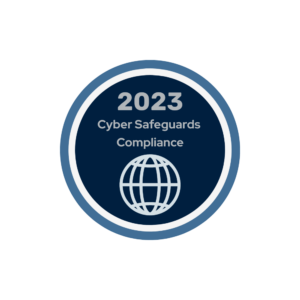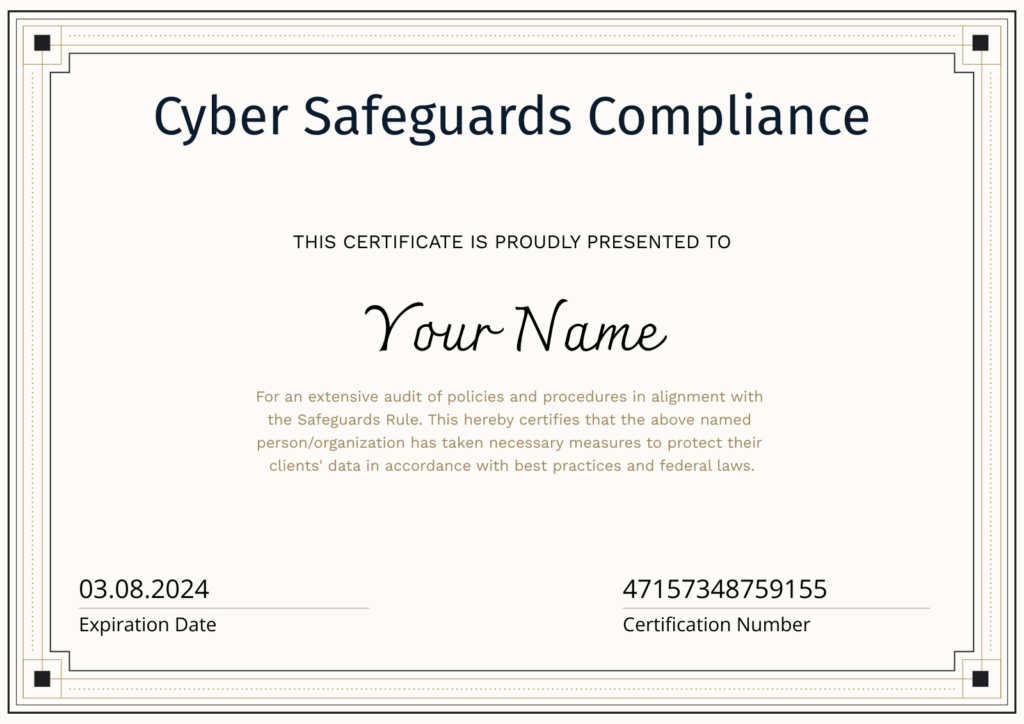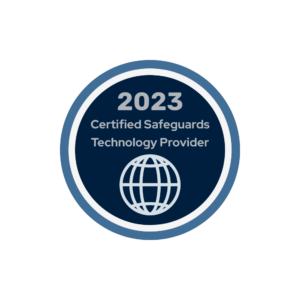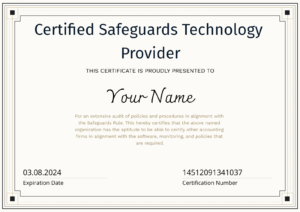2023 Cyber Safeguards Compliance
Introducing two new forms of compliance in response to new legal requirements. We have established the framework for Cyber Safeguards Compliance and Certified Safeguards Technology Provider.
Similar to PTIN Security Certifications, which focus more on IRS publications and guidelines, the Safeguards Compliance certifications focus on requirements from the Federal Trade Commission’s Safeguards Rule which protects consumers’ financial data at tax and accounting firms.
Cyber Safeguards Compliance
Certified Safeguards Technology Provider




Cyber Safeguards Compliance
(For Accounting Firms)
Use this as a validation that your firm is doing everything it can to protect it’s customers’ personally identifiable information (PII).
You can obtain this certification through an audit and implementation of an information security program (ISP) from a Certified Safeguards Technology Provider.
As technology continues to advance, the risks and threats to data security are growing more severe. Accounting firms are particularly vulnerable to cyberattacks due to the sensitive financial information they handle daily. That’s why it’s crucial for accounting firms to prioritize cybersecurity and obtain the 2023 Cyber Safeguards Compliance certification.
The compliance certification is a comprehensive cybersecurity certification that covers a wide range of topics such as data privacy, cloud security, network security, and threat management. This certification will help accounting firms understand the current cybersecurity landscape, identify risks, and implement measures to mitigate them. The mitigation is conducted and executed by a third party managed service provider (MSP) that is held accountable by the PTIN Security Group to ensure that your firm is under compliance and not just telling you blindly that it is compliant.
One of the main reasons why accounting firms should obtain this certification is to ensure compliance with industry standards and regulations. Many financial institutions and government agencies have implemented strict cybersecurity guidelines that accounting firms must follow. These regulations help ensure that sensitive financial information remains secure and confidential. Failure to comply with these regulations can result in hefty fines and damage to the firm’s reputation.
By obtaining the 2023 Cyber Safeguards Compliance certification, accounting firms can demonstrate their commitment to cybersecurity and compliance. This certification will help them build trust with their clients and reassure them that their financial data is in safe hands.
Moreover, the 2023 Cyber Safeguards Compliance certification can help accounting firms stay ahead of emerging threats. Cybersecurity threats are constantly evolving, and it’s crucial for accounting firms to stay up to date with the latest security measures. The certification covers topics such as threat management and incident response, which will help firms develop a proactive approach to cybersecurity.
Another advantage of obtaining the 2023 Cyber Safeguards Compliance certification is that it can help accounting firms improve their internal processes and procedures. The certification covers topics such as risk assessment and business continuity planning, which will help firms identify potential vulnerabilities in their operations and develop strategies to mitigate them.
In addition to compliance, cybersecurity is becoming an increasingly important factor in client acquisition and retention. Clients want to work with accounting firms that take their data security seriously. Obtaining the 2023 Cyber Safeguards Compliance certification will provide accounting firms with a competitive edge over their peers and help them win new business.
Finally, cybersecurity is a critical component of overall business continuity. In the event of a cyberattack or data breach, accounting firms must have a plan in place to ensure that they can continue to operate and provide services to their clients. The “2023 Cyber Safeguards Compliance” certification covers topics such as disaster recovery and business continuity planning, which will help firms develop robust contingency plans and ensure they can continue to serve their clients in the event of a security incident.
Obtaining the 2023 Cyber Safeguards Compliance certification is an essential step for accounting firms that want to ensure compliance with industry regulations, stay ahead of emerging threats, improve their internal processes, and win new business. With the increasing risks to data security and the growing importance of cybersecurity, accounting firms cannot afford to be complacent. By obtaining this certification, they can demonstrate their commitment to cybersecurity and build trust with their clients.
To learn more, read about why it’s a good idea to use a Certified Safeguards Technology Provider.
Learn about the benefits of having a Cyber Safeguards Compliance.
Certified Safeguards Technology Provider
(For IT Firms)
As the demand for managed IT services continues to grow, the need for robust cybersecurity measures becomes more critical. Managed Service Providers (MSPs) play a crucial role in helping businesses, particularly accounting firms, secure their IT infrastructure against cyber threats. To further enhance their capabilities and meet the growing demand for cybersecurity, MSPs should consider becoming a certified safeguards technology provider.
Becoming a certified safeguards technology provider requires MSPs to demonstrate their proficiency in cybersecurity measures, particularly in the areas of data privacy, cloud security, network security, and threat management. By obtaining this certification, MSPs can provide accounting firms with the assurance that their IT infrastructure is secure, compliant, and resilient to cyber threats.
One of the primary benefits of becoming a certified safeguards technology provider is that it enables MSPs to provide customized cybersecurity solutions to their clients. Accounting firms have unique cybersecurity requirements, and MSPs must understand their clients’ needs to deliver effective security measures. The certification provides MSPs with a framework to develop customized security solutions that meet the specific needs of accounting firms.
Moreover, becoming a certified safeguards technology provider helps MSPs enhance their cybersecurity capabilities, enabling them to provide comprehensive security measures. The certification covers a broad range of cybersecurity topics, including risk assessment, threat management, and incident response. By obtaining this certification, MSPs can develop a proactive approach to cybersecurity, identifying potential vulnerabilities before they can be exploited by cybercriminals.
Another significant benefit of becoming a certified safeguards technology provider is that it allows MSPs to provide a higher level of service to their clients. Accounting firms need to focus on their core business operations and rely on MSPs to manage their IT infrastructure. By obtaining the certification, MSPs can provide accounting firms with the assurance that their IT infrastructure is secure and compliant, allowing them to focus on their core business operations.
In addition to providing customized solutions and enhanced cybersecurity capabilities, becoming a certified safeguards technology provider can also help MSPs differentiate themselves in a crowded market. Many MSPs offer similar services, but not all have the expertise and certifications to provide comprehensive cybersecurity solutions. By obtaining the certification, MSPs can differentiate themselves from their competitors and attract more clients, particularly in the accounting industry.
Furthermore, becoming a certified safeguards technology provider can help MSPs stay ahead of emerging cybersecurity threats. The certification covers a broad range of cybersecurity topics, including emerging threats such as ransomware and phishing attacks. By staying up to date with the latest cybersecurity measures, MSPs can provide their clients with the most effective security solutions.
Finally, becoming a certified safeguards technology provider can help MSPs build trust with their clients, particularly in the accounting industry. Accounting firms handle sensitive financial information and must ensure that their IT infrastructure is secure and compliant. By obtaining the certification, MSPs can provide accounting firms with the assurance that their IT infrastructure is secure, reducing the risk of a data breach or cyberattack.
In conclusion, becoming a certified safeguards technology provider is an essential step for MSPs that want to enhance their cybersecurity capabilities, provide customized solutions, differentiate themselves in a crowded market, stay ahead of emerging cybersecurity threats, and build trust with their clients, particularly in the accounting industry. As the demand for managed IT services continues to grow, the need for robust cybersecurity measures becomes more critical. By obtaining the certification, MSPs can meet the growing demand for cybersecurity solutions and provide accounting firms with the assurance that their IT infrastructure is secure, compliant, and resilient to cyber threats.
